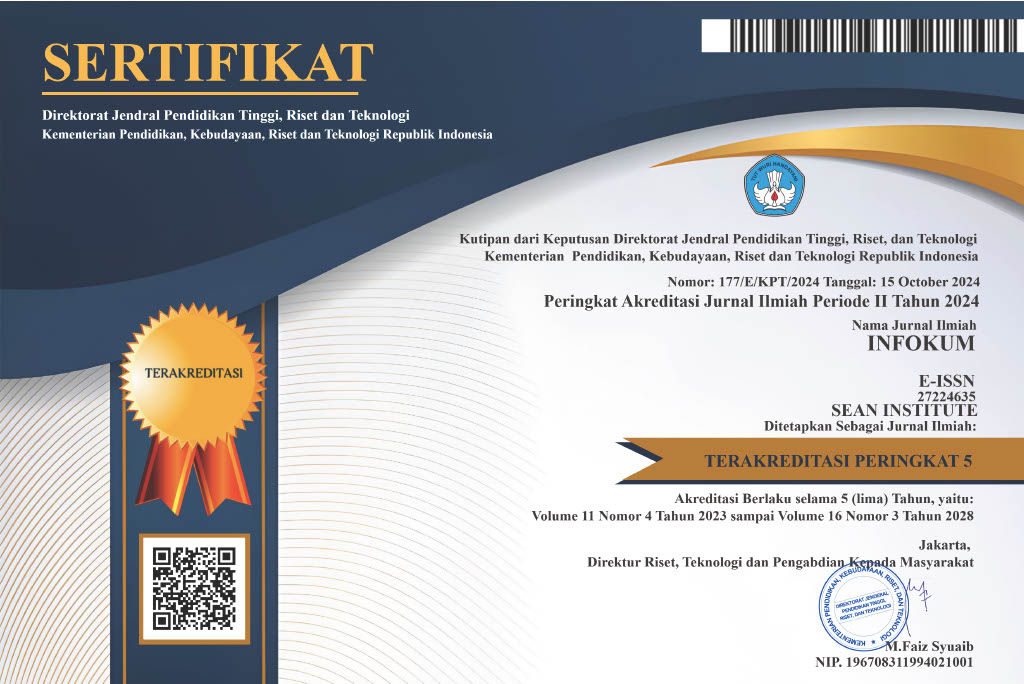Implementation of Electronic-Based Government System (SPBE) in Pegunungan Bintang District, Papua Pegunungan Province
Abstract
The implementation of the Electronic-Based Government System (SPBE) in the Pegunungan Bintang Regency Government, Papua Province, still faces various challenges that hinder the optimization of its implementation. This study aims to analyze, describe, and identify the dynamics of SPBE implementation, the inhibiting factors faced, and the strategies implemented by the Pegunungan Bintang Regency Government in overcoming these obstacles. This study uses a qualitative approach with a descriptive method. The sampling technique was carried out through purposive sampling and snowball sampling. Data were collected through observation, semi-structured interviews, and documentation studies. Data analysis was carried out with the stages of data reduction, data presentation, and drawing conclusions and verification to obtain comprehensive findings. The results of the study revealed that the implementation of SPBE in Pegunungan Bintang Regency has not run optimally when viewed based on the theory of Elements of Success in E-Government Implementation from the Harvard JFK School of Government. Several main inhibiting factors include limited quantity and quality of human resources, inefficient budget allocation to support digital transformation, and the absence of regional regulations that form the legal basis for SPBE implementation. To overcome these obstacles, the local government has taken strategic steps, such as compiling a periodic Workload Analysis (ABK), optimizing budget planning and management to support the implementation of SPBE, and strengthening cross-regional coordination in designing the SPBE architecture. In addition, the Communication and Informatics Office of Pegunungan Bintang Regency is also trying to compile a Standard Operating Procedure (SOP) to clarify the SPBE implementation mechanism at the local government level.
Downloads
References
Creswell W. John, 2022. Research Design Pendekatan Metode Kualitatif, Kuantitatif dan Campuran, Pustaka Belajar, Yogyakarta.
DwiyantoAgus.(2017).ManajemenPelayananPublik,EdisiKedua. GadjhaMadaUniversityPress.
Faber Bram, Gradus Raymond, 2018. Assessing electronic service delivery in municipalities: determinants and financial consequences of E-Government implementation. Local Government Studies.
Polyando, Petrus. 2023. Transformasi Tata Kelola dan Manajemen Pemerintahan Daerah di Era New Normal. Depok : Rajawali Pers Ibrahim, Adelina, Assaf Arief, and Saiful Do Abdullah. “Keamanan Untuk Penerapan Layanan Publik Pada Sistem Pemerintahan Berbasis Elektronik (Spbe): Sebuah Kajian Pustaka Sistematis.”
Sedarmayanti,2018,KomunikasiPemerintahan(Bandung,PTRefika Aditama).
Silalahi,Ulbert.2005.StudiTentangAdministrasi.Cetakankeenam.Bandung :SinarBaruAlgensindo.
Simangunsong,Fernandes.2017.MetodepenelitianPemerintahan. Bandung:Alfabeta.
Sugiyono,2019.MetodePenelitianKuantitatif,KualitatifdanR&D. Bandung:Alfabeta
Suliyanto, 2018. Metode Penelitian Bisnis Untuk Skripsi, Tesis & Disertasi. Yogyakarta: CV.Andi offset
Sumaryadi Nyoman I, 2018. Sosiologi Pemerintahan dari Perspektif Pelayanan,Pemberdayaan,InteraksidanSistemKepemimpinan Pemerintahan Indonesia, Ghalia Indonesia, Bogor.
Westa.(1985).PsikologiPengajaran.Jakarta:MediaAbadi.
Winardi.2005.MotivasidanPemotivasiandalamManajemen. Jakarta:PT.RajaGrafindoPustaka.
Syafri Wirman, Nur S.A, 2025. Government Dynamic Capabilities. Alqaprint Jatinangor, Sumedang.
World Bank Definitions of E-government dalam Kumar, Vinod. 2015. E-governance for Smart Cities. Singapore: Advances in 21st Century Human Settlements. Springer.
Choirunnisa Laili, Peran Sistem Pemerintahan Berbasis Elektronik (SPBE) Dalam Meningkatkan Aksebilitas Pelayanan Publik Di Indonesia. Sosio Yustisia (Jurnal Hukum dan Perubahan Sosial), Vol 3, No.1 Mei 2023; p-ISSN: 2776-4540; e-ISSN:2776-3323
Rusdy Rifal Iman R.M. Flambonita Suci 2023. Penerapan Sistem Pemerintahan Berbasis Elektronik (SPBE) Di Pemerintah Daerah UntukMewujudkanGoodGovernanceju-malIlmiahIlmuHukum.27 Mei 2023.
Putra Decky S, Selo, Fauziati Silmi, 2022. Evaluasi, Domain Manajemen SPBE Pemerintah Kota Yogyakarta Berdasarkan PeraturanMenteriPAN-RBNomor59Tahun2020.JIKO(Jumal Informatika dan Komputer), Vol. 5, No. 1. April 2022.
Adu ArifinLa, Hartanto Rudy, dan SilmiFauziati, 2022. Hambatan- hambatan dalam im-plementasi layanan Sistem Pemerintahan Ber-basisElektronik(SPBE)padaPemerintahDaerah.JIKO(Jurnal Informatika dan Komput-er) Vol. 5, No. 3, Desember 2022.
Prawira Giri Mahakrisna, Panjaitan Chrisna D Ananda, Paranity Poetri AA. 2023. Imple-mentasi Sistem Pemerintahan Berbasis Elektronik di Pemerintah Kabupaten Ta-banan. Jurnal Raad Kertha Vol. 6, No.1 Periode Pebruari 2023-Juli 2023.
Khaidarmansyah, Saifuddin Ridwan, 2022. Optimalisasi Penyelenggaraan-SistemPemerintahanBerbasisElektronik (SPBE) di ProvinsiLampung.JurnalManajemen.Vol. 16, No. 1 April 2022.
IJIS – Indonesian Journal On Information System 5, no. 2 (2020): 135.
Undang-undang Nomor 23 Tahun 2014 Tentang Pemerintah Daerah
PeraturanPresidenNomor95Tahun2017TentangSistem Pemerintahan Berbasis El-ektronik
Instruksi Presiden Republik Indonesia Nomor 3 Tahun 2023 TentangKe-bijakandanStrategiNasionalPengembanganE- Government
Kementerian Komunikasi dan Informatika Republik Indonesia. (2020). Visi Indonesia Dig-ital 2045. Jakarta: KEMENKOMINFO
Kementerian Pendayagunaan Aparatur Negara dan Reformasi Birokrasi. (2023). Laporan Pelaksanaan Evaluasi SPBE Tahun 2022. Jakarta: KEMENPAN-RB.
LaporanPelaksanaanPemantauandanEvaluasiSPBETahun2022Kemenpan-RB
https://papua.antaranews.com/berita/683873/bakti-tak-gentar-membangun-bts-4g-di-pegunungan-bin-tang#:~:text=Sebanyak%20196%20menara%20BTS%204G,kabupaten%20tersebut%20sebanyak%20261%20titik.
http://scholar.unand.ac.id/115730/5/Cover%20dan%20Abstrak.pdf
PERAN+SISTEM+PEMERINTAH+BERBASIS+ELEKTRONIK+(SPBE)+DALAM+MENINGKATKAN+AKSESIBILITAS+PELAYANAN+PUBLIK+DI+INDONESIA+(1).pdf
https://www.google.com/search?q=apa+perbedaan+pelaksanaan+dan+penerapan&sca_esv=2a19a3414e05e997&sca_upv=1&sxsrf=ADLYWIK3f2Mkg4QAARkVy_-PCwxFYOB3Pw%3A1721663756539&ei=DIGeZuTGIPyz4-
MYgwHCAg0QABiABBhDGMkDGIoFwgILEAAYgAQYkgMYigXCAg4QABiABBixAxiDARiKBcICDRAAGIAEGLEDGEMYigWYAwyIBgGQBgi6BgYIARABGAuSBwUxMi4x
NaAHvMUB&sclient=gws-wiz-serp
https://www.worldbank.org/en/topic/digitaldevelopment/brief/E-Government










